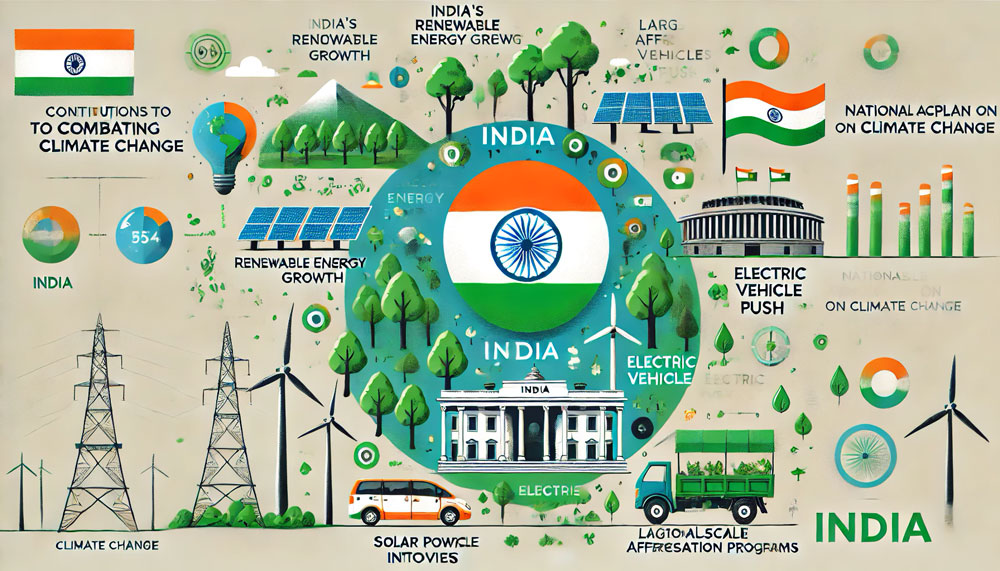India can play a significant role in addressing global climate change through various strategies and initiatives. Here are several ways in which India can contribute:
- Commitment to International Agreements: India is a signatory to the Paris Agreement, committing to reduce greenhouse gas emissions and promote sustainable development. Strengthening and adhering to these commitments can enhance India’s credibility on the global stage.
- Transition to Renewable Energy: India has set ambitious targets for expanding its renewable energy capacity, particularly solar and wind power. By investing in renewable energy, India can reduce its dependence on fossil fuels and contribute to global efforts to lower carbon emissions.
- Sustainable Urban Development: Urbanization in India presents challenges and opportunities. By promoting sustainable urban planning and development, including efficient public transportation, green buildings, and waste management systems, India can reduce its carbon footprint.
- Afforestation and Reforestation: India can enhance its forest cover through afforestation and reforestation initiatives. Forests act as carbon sinks, absorbing CO2 from the atmosphere and helping to mitigate climate change.
- Promotion of Electric Vehicles (EVs): Transitioning to electric mobility can significantly reduce emissions from the transportation sector. India can incentivize the production and adoption of EVs, supporting infrastructure development for charging stations.
- Water Management: Climate change affects water resources, and India can lead efforts in sustainable water management practices, including rainwater harvesting, wastewater recycling, and efficient irrigation techniques, to adapt to changing climate patterns.
- Climate-Resilient Agriculture: India can promote climate-smart agricultural practices that increase resilience to climate impacts while maintaining food security. This includes improving crop varieties, adopting agroforestry, and enhancing soil health.
- Research and Innovation: Investing in climate research and technology development can position India as a leader in climate solutions. Collaboration with international organizations and universities can foster innovation in sustainable practices.
- Strengthening Climate Governance: India can establish and enhance institutions dedicated to climate action, ensuring that policies are effectively implemented and monitored at both national and local levels.
- Global South Leadership: As one of the largest developing countries, India can advocate for the interests of other developing nations in international climate negotiations, emphasizing the need for financial and technical support to address climate change.
- Public Awareness and Education: Promoting public awareness about climate change and sustainability can drive grassroots movements and encourage responsible consumption patterns among citizens.
- International Collaboration: Engaging in partnerships with other countries, NGOs, and international organizations can facilitate knowledge sharing and resource mobilization for climate initiatives.
By adopting these strategies, India can contribute meaningfully to global efforts to combat climate change, balancing its developmental needs with environmental sustainability.

Vinod Ram has been in Software Industry since 2006 and has experience of over 16 years in Software Development & Project Management domain specialised majorly in LAMP stack & Open Source Technology, building enterprise level Web based Application, Large Database driven and huge traffic Websites and Project Management.
He loves to write information articles and blog to share his knowledge and experience with the outside world and help people to find solution for their problems.
